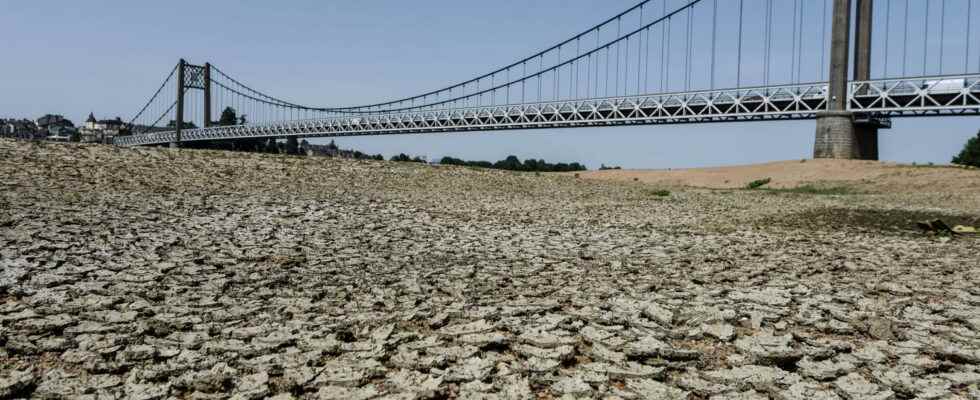DROUGHT. All of France is now affected by the drought and 46 departments have been placed on the “alert” level of the drought plan. We explain to you.
[Mis à jour le 04 août 2022 à 15h32] “The month of July 2022 is the driest we have had since July 1959”, assures the Minister of Ecological Transition, Christophe Béchu. At the beginning of August, no French department escaped the drought, after the passage of Paris, Hauts-de-Seine, Seine-Saint-Denis and Val-de-Marne in “vigilance drought”, Tuesday August 2 by the prefecture of Ile-de-France.
Also, the whole country is concerned by one of the four levels of vigilance established by the State within the framework of the drought plan: “vigilance”, “alert”, “reinforced alert” and “crisis”. In total, 46 departments of France are concerned (in part or in full) by this last level of alert.
A context conducive to fires and forest fires, but also to water shortages: in Haute-Corse, the prefecture is alert to the drought that is hitting the island of beauty. “If we continue at this rate of water consumption, given the expected weather developments, there will be no more water in 25 days,” she warned in a press release on Tuesday evening August 2. In July, the driest month since 1958, only 9.7 millimeters of precipitation was recorded in mainland France, a deficit of around 84% compared to normal for the period 1991-2020.
Everywhere in France, water restrictions apply, at different levels. Concrete measures have been put in place to limit water consumption for individuals, businesses and communities. For example, it may be forbidden to wash your car or water your garden.
It is recommended to implement small daily actions to save water. To anticipate, water companies also call on all users (individuals, companies, industrialists, public services, etc.) to “sobriety” in the way they consume water in the face of this drought situation. Everyone at their own level can do something. For example, take showers instead of baths or turn off the water when washing your hands or teeth.
Which departments are on drought alert 2022? The list
Still new departments are affected by drought vigilance. As of August 1, 2022, 96 departments are affected by the climate phenomenon and calls for water saving: 4 departments are at the “vigilance” level, 9 are on “alert”, 38 on “enhanced alert” and 46 in “crisis.”
Departments on “vigilance” : Paris, Hauts-de-Seine, Seine-Saint-Denis and Val-de-Marne.
The departments at the “crisis” level (red alert): 46 departments are affected by this state of crisis for at least part of their territory. We can mention Bouches-du-Rhône, Drôme, Indre, Loire-Atlantique, Mayenne or Sarthe, but also on part of the territory the Alpes-Maritimes, Dordogne, Ille et Vilaine, Isère , Loiret, Lot, Puy-de-Dôme or Vendée.
What is the drought map of France?
Propluvia is the institute of the Ministry of Ecological Transition responsible for monitoring water levels and the internet platform that allows direct consultation of water restriction orders. The site includes a scalable map to view the areas affected by these prefectural decrees.
What are the different drought alert levels? What are the restrictions?
There are four main levels of drought vigilance and all of them result in the implementation of specific measures.
- Vigilance drought (level 1): informing and encouraging individuals and professionals to save water.
- Alert (level 2): measures prohibiting the operation of valves, nautical activity, prohibition at certain times of watering gardens, green spaces, golf courses or washing one’s car. For farmers, reduction of levies for agricultural purposes below 50% (or ban up to 3 days a week).
- Heightened alert (level 3): stronger limitation of withdrawals for watering gardens, green spaces, golf courses, car washing, etc., until certain withdrawals are prohibited. For farmers, reduction of levies for agricultural purposes greater than or equal to 50% (or ban greater than or equal to 3.5 days per week).
- Crisis (level 4): cessation of non-priority withdrawals, including withdrawals for agricultural purposes. Only withdrawals to ensure the exercise of priority uses are authorized. They concern sectors such as health, civil security, drinking water and sanitation.
As drought episodes are more and more frequent in France, the Ministry for Ecological Transition and Territorial Cohesion and the Ministry for Energy Transition have published an informational video on their Twitter account on the causes and consequences of the drought, but also on the daily actions to be taken, whether you are an individual, a company or a community, to reduce your water consumption.
Drought episodes are more and more frequent and begin earlier in the year.
What are the causes and consequences of these phenomena? How to act on a daily basis to reduce your water consumption? Answers in pictures @AdeMontchalin pic.twitter.com/3dJYhmn0xs– Ministries Ecology Energy Territories (@Ecologie_Gouv) May 26, 2022
What are the small gestures that can help limit dryness?
Individuals have a role to play in limiting drought, in particular through small everyday gestures summarized by the website of the Ministry of Ecological Transition:
- Avoid letting the water run
- Limit the watering of my garden,
- Install water-saving equipment,
- Take a shower instead of a bath
- Install a rainwater collector or containers under the gutter downspouts and in the garden to water it,
- Repair water leaks,
- Avoid running your washing machine or dishwasher half empty.
